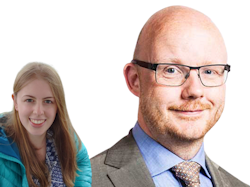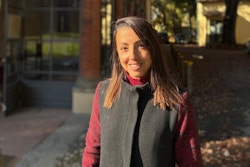2022 marks a year growth for Una Europa, highlighted by new member Universiteit Leiden joining the alliance. Amongst so much change it is important to reconnect with our community, the staff and students that drive our work, to ensure we are on the right path.
Rachel Weller, University of Edinburgh representative on the Una Europa Student Board, spoke to our new Chair of the Una Europa Board of Directors James Smith, Vice Principal International and Professor of African and Development Studies at the University of Edinburgh, to share his views on reconnecting with our community and where he hopes to take Una Europa in 2022.
Congratulations on your new role as Chair of Una Europa Board of Directors, taking over from Verena Blechinger-Talcott.
What does it mean to you to be Chair of the Board of Directors?
It is a great honour because Una Europa is such an important alliance of really important universities, and I'm really proud that Edinburgh is an integral part of that. I'm also really excited by the vision behind Una Europa of creating a virtual, hybrid University of the Future which allows staff and students to experience other campuses, other communities, other cultures and other countries; I think is really powerful one.
I'm really happy we've reached this point because, when the Brexit vote happened, it was a concern for universities like Edinburgh to continue to maintain our strong relationships with European partners. We have worked hard for two or three years now, to work to that end, and Una Europa is really the most important way in which we're doing that. I'm glad we've reached this point and very happy that myself and the University of Edinburgh have been given this opportunity, given that we're obviously integral to Europe but not currently part of the EU. It feels really symbolically important for the University of Edinburgh for that reason.
From your response I can see that there are many things that excite you about this alliance. What do you think excites you most?
What excites me most is the opportunity to give more students and colleagues the chance to travel as an integral part of their degree. As an international student myself, I studied for my Master’s and PhD in South Africa, and it was a much more profound, deep and life-changing opportunity for me than completing my undergraduate degree in my hometown university in Scotland. It really transformed me in many ways.
I've seen, over the years, the push, possibility and opportunity that international education gives to University of Edinburgh students and staff. I'm really keen that this provides an opportunity for a far larger proportion of staff and students to spend time overseas. Perhaps not a full year, perhaps not for a full degree, but an opportunity to feel part of something much bigger than Edinburgh, the City of Edinburgh and Scotland.
" The vision behind Una Europa - creating a virtual, hybrid University of the Future which allows staff and students to experience other campuses, other communities, other cultures and other countries - I think is a really powerful one. "
2022 is a year of transition for Una Europa - the end of 1Europe & the launch of our Joint Doctorate & Bachelor's programmes.
What is the biggest impact that Una Europa will bring over the next six years?
I think the biggest impact will be a deepening of collaboration across the nine partner universities. I hope we'll see a really significant proportion of our students spending time on joint degrees, but also just spending time on other campuses and collaborating with students. We have just over 45,000 students at Edinburgh; within Una Europa we have 10 times that number. It would be great if, by 2030, all students at those nine, or perhaps more by then, universities felt part of their home university and also part of this much broader community. That would be an amazing learning opportunity for everyone.
Obviously these are excellent goals, but what do you foresee as the greatest challenges to our work?
I think the greatest challenge is probably time. Everybody is incredibly busy – professional service colleagues are working extremely hard; academics are working really hard and clearly Covid has put additional pressures on how we deliver teaching. Our student community, as well, has really felt the pressure of the last couple of years.
I think we need to find ways to carve out time to allow all three of these communities to think about how they can best engage with Una Europa, how they can best take advantage of opportunities and how we can build a set of structures or pathways or programmes which allow that free flow of movement of ideas and collaboration.
" It would be great if, by 2030, all students at those nine, or perhaps more by then, universities felt part of their home university and also part of this much broader community. "
As you've mentioned, the end of 1Europe in November 2022 also marks change for the University of Edinburgh’s role in Una Europa.
The UK's withdrawal from the Erasmus+ programme means that Edinburgh cannot be full partner in future Erasmus+ funded projects.
How will Edinburgh continue to collaborate with Una Europa, despite the challenges presented by Brexit?
One of the really unique things about Una Europa is that it's not simply the funded Erasmus+ projects; there's also the central legal entity, Una Europa vzw, who drive everything. Because Una Europa is an institutional commitment, there are still many opportunities for Edinburgh to be involved. We still have very big commitments to support our students to spend time with our European partners, we still are committed to transnational education. We still are committed to finding interesting ways to collaborate. We will simply have to find more creative ways to fund that activity and carve out time for colleagues to get involved.
As a university, we have made a very strong commitment to continuing to be as fully involved as we can, in both teaching and learning and research and innovation.
What is the impact of Edinburgh’s continued commitment to Una Europa & thus European/ international higher education landscape?
I hope the impact of Edinburgh’s continuing engagement, and by extension the other five or six British universities too, is that it means there can be an ongoing conversation about the boundaries of that landscape. I think the power of any organisation which looks to consolidate and draw resources together to deliver more, is how it can then reach out and engage with the rest of the world.
I think that there needs to be a recognition, as well, that having universities who are outside of the EU, but are committed to contributing in, also provides other opportunities for European University Alliances. UK Universities, by virtue of language, tend to be more engaged with North American universities than continental European universities. There are connections there that become important: maybe to China, maybe to other parts of the world. So, there may be a role for UK universities to act as a fulcrum: a connective point into Europe, but also to the rest of the world.
" Because Una Europa is an institutional commitment, there are still many opportunities for Edinburgh to be involved… We will simply have to find more creative ways to fund that activity and carve out time for colleagues to get involved. "
Thank you. Is there anything else you would like to share with the Una Europa community?
I hope my enthusiasm is self-evident!
Where I would like us to get to – and this is a challenge, because each of the Una Europa partner universities are large – is we need to connect back into universities and show our staff and students the opportunities. Una Europa’s existence is for those communities. It's to create opportunities for those communities to learn better, to research better, to collaborate better, to have a more transformational experience during their time at university.
Ideally, we need to be engaging with the majority of students and staff at our universities, so that our community of half a million people feels that Una Europa can really add value for them. That requires a lot of work. It requires funding, it requires communication, and it requires time to think about how we can integrate what Una Europa can offer to existing teaching and research programmes. That would be my hope, that by 2030 at least 50% of the entire community of these nine universities feels Una Europa is for them, and they have tangibly benefitted from Una Europa in some form.
Finally, for a fun question: if you could visit any Una Europa City for just one day, where would you go and why?
That's a good question, because there's a reason to visit every Una Europa city!
I would have to say Bologna, by virtue of the fact that my wife from Parma, which is about 30 minutes away, and I'm in the middle of seeking Italian citizenship. So I can improve my very dodgy Italian and enjoy a bit of winter sun.



